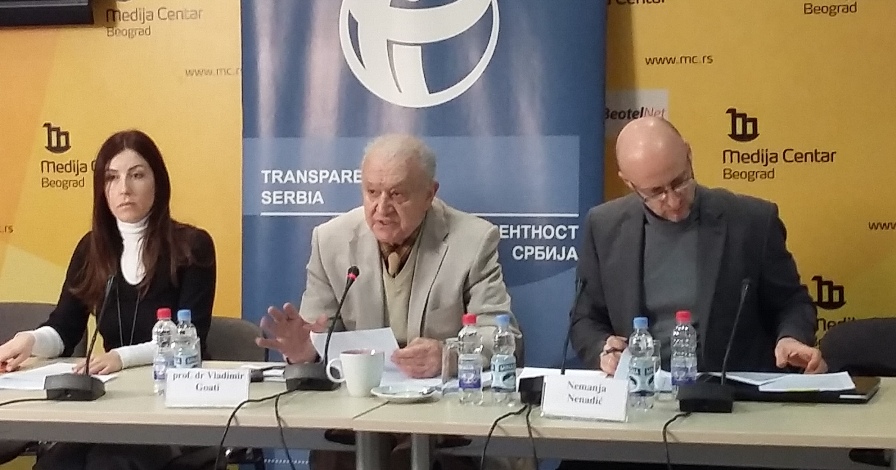Serbia CPI 2016 - stagnation in the list, the absence of substantive progress in reality
Transparency Serbia presented today the Corruption Perceptions Index (CPI) 2016, the most well-known ranking of countries according to perception of corruption in the public sector. Serbia is still considered the country where the level of corruption is high (72nd of 176 countries with the score of 42 out of possible 100). Essentially, there are no significant changes in the rankings of Serbia since 2008.

According to estimation of Transparency Serbia stagnation in research on corruption was caused not only by the fact that the perception of corruption is slow to change, but also with the absence of substantial progress in this area. It is not realistic to expect that the image that others have of us will change, if we do not solve the problems pointed out each year by the domestic public, independent state organs and the European Commission, and if those cases of suspected corruption that are being reported, remain uninvestigated.
Years in which fight against corruption was one of the top priorities of the Government and citizens, were not used to strengthen the institutions, which would ensure that the system works regardless of the existence of "political will", nor were European integrations used enough to initiate reforms. A significant part of the activities from the Action Plan for Chapter 23 of European integration, which are formulated insufficiently ambitious, were not implemented even on the formal level. Besides, some assessments on the fulfillment are disputable - such as the one that is being evaluated as "successfully implemented" and refers to Government handling parliamentary conclusions based on the reports of the independent state organs . Transparency Serbia outlined in a separate document main priorities for the fight against corruption and review of the activities of the current Government and the Assembly in this field in the past six months .
Corruption Perceptions Index is being created for twenty second year in a row, by a leading anti-corruption organization globally, Transparency International. This year 176 countries and territories are ranked, eight more than in the previous survey. Countries are scored on a scale from 100 (very 'clean) to 0 (highly corrupt). Serbia was this year ranked 72nd (last year 71), with a score of 42, which is slightly better than in the previous two years (40, 41) and the same as in 2013.
On the top of the list are Denmark and New Zealand with 90 points, while Somalia is at the bottom with 10. Among the former socialist countries of Europe, best placed is Estonia with a score of 70, and from the former Yugoslavia - Slovenia with 61. Among the countries of the wider region that are not members of the EU, best perception is for Georgia (57). Serbia is better positioned than one EU country (Bulgaria, 41), worse ranked neighbors are Bosnia and Herzegovina, Albania (both with 39) and Macedonia (37). Kosovo is subject of special research and its evaluation is 36.
It is important to point out that the citizens of Serbia have perception of widespread of corruption as well, which stems from the results of researches carried out on a national sample (e.g. The Global Corruption Barometer of Transparency International, UNDP surveys), although in these surveys the fluctuations in the perception of corruption are significantly higher. High perception of corruption is a problem, because of creating prejudice that without corruption no job can be done. However, the priority of the state authorities should be to prevent, detect and punish existing corruption, and not changing perception of its widespread.
CPI takes into account 13 relevant surveys that measure perception of corruption in the public sector. These surveys represent the opinion or perception of corruption of state officials and public servants by those who do business with them or who advise businessmen, governments and international institutions. Mostly, respondents are based abroad. Surveys must be published in the last 24 months and there must be at least three such data sources for one country to be ranked.
This year Serbia, as in the past, was comprehended with a total of seven relevant surveys, which guarantee a high degree of reliability of findings, as well as comparability of data with those from previous years. Surveys used were from the Global Insight Country Risk Ratings, Bertelsmann Foundation, World Economic Forum, the Economist Intelligence Unit, Freedom House, International Country Risk Guide, World Justice Project Rule of Law Index.
Of the surveys that are relevant for Serbia, three were implemented and published during 2016. Four studies include data from 2015, and one of them from the previous period. Ratings from individual surveys vary from 32 to 57. The standard deviation is (3.69). This example shows the benefit of the CPI, as an aggregate index, that finds the middle between such different views of the situation.
Transparency - Serbia,
Belgrade,
January 25, 2017.


















